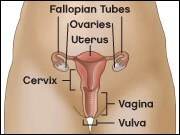Vaginal and Vulvar Cancers
When cancer starts in the vulva, it is called vulvar cancer. The vulva is the outer part of the female genital organs. It has two folds of skin, called the labia. Vulvar cancer most often occurs on the inner edges of the labia. When vaginal and vulvar cancers are found early, treatment is most effective. Treatment of vulvar cancer, in particular, often leads to a cure. Learn more by downloading the Inside Knowledge campaign’s vaginal and vulvar cancer fact sheet. (PDF-268KB) Signs and SymptomsEarly on, most vaginal cancers do not cause signs and symptoms. But if there are symptoms, they may include:
Many women who have vulvar cancer have signs and symptoms. They may include:
It is important for you to pay attention to your body and know what is normal for you. If you have any of these symptoms for more than two weeks, talk to your doctor, nurse, or other health care professional right away. Symptoms may be caused by something other than cancer, but the only way to know is to see your health care professional. Who Gets Vaginal and Vulvar Cancers?Vaginal and vulvar cancers are very rare. While all women are at risk for these cancers, very few will get them. In 2004,* vaginal cancer accounted for only 1 to 2 percent of all gynecologic cancers. Vulvar cancer accounted for approximately 5 percent of all gynecologic cancers. In 2004, 1,130 women in the United States were told that they had vaginal cancer and 3,631 women learned they had vulvar cancer.† †U.S. Cancer Statistics Working Group. United States Cancer Statistics: 2004 Incidence and Mortality. Atlanta (GA): Department of Health and Human Services, Centers for Disease Control and Prevention, and National Cancer Institute; 2007. *The most recent year for which statistics are currently available.
Page last reviewed: March 14, 2008
Page last updated: March 14, 2008 Content source: Division of Cancer Prevention and Control, National Center for Chronic Disease Prevention and Health Promotion |
![]() Reprinted with CDC permission
Reprinted with CDC permission
 Cancer is a disease in which cells in the body grow out of control. Cancer is always named for the part of the body where it starts, even if it spreads to other body parts later. When cancer starts in the vagina, it is called vaginal cancer. The vagina, also called the birth canal, is the hollow, tube-like channel between the bottom of the uterus and the outside of the body.
Cancer is a disease in which cells in the body grow out of control. Cancer is always named for the part of the body where it starts, even if it spreads to other body parts later. When cancer starts in the vagina, it is called vaginal cancer. The vagina, also called the birth canal, is the hollow, tube-like channel between the bottom of the uterus and the outside of the body.